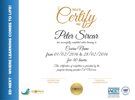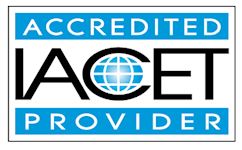Child Care Worker
Ed-Next
Summary
- Exam(s) / assessment(s) is included in price
- Tutor is available to students
Overview
Love working with children and want to learn techniques for supporting their development? Our Child Care Worker course provides practical advice to prepare you for your role as an educator of young children. Learn the principles of providing ultimate learning environments, developing engaging curricula for various developmental stages, meeting children’s social-emotional needs and interests, and communicating and interacting with parents and staff professionally. This course covers the historical influences on early childhood education as well as quality standards for programs and types of curriculum methods. It also includes learning strategies and guidance to enhance physical, cognitive, language, social-emotional, and creativity development.
After completing this course, you should be able to:
- Recognize the historical influences on early childhood education, as well as assessment methods and evaluations for quality standards
- Identify the basics of the early education domains, how to support learning and play and the concepts of different types of curriculum
- List the basics of learning theories and teaching strategies
- Recall how to provide effective learning environments for children while connecting with families and communities
- Recognize issues in early childhood education and how to advocate for young children, as well as discovering various career options in the field
With our child day care management distance learning course, you can learn the key concepts involved in being a child care worker. You could even learn some basic ideas on how to start a home day care business!
A child care worker is a special person who helps children grow, learn, and gain new skills every day. A child care worker also provides behavioral and emotional support so children feel safe and comfortable while with a child care worker.
After completing this course, you should be able to:
- Recall the elements involved in starting a daycare business
- Recognize the requirements and considerations for planning a daily schedule
- Identify methods for generating enrollment, solving common problems and setting professional goals
- List example activities for early childhood curriculum
- Identify methods and considerations for developing curriculum
Course media
Description
Child Care Worker Module 1
Historical Influence on Early Care and Education
- Learning from the Past
- Public Schooling in America
- The Kindergarten Movement
- Nursery School Movements
- Early Twentieth Century Schooling
- Brown vs. Board of Education
- Mid-Twentieth Century Schooling
- Establishment of Head Start
- Universal Pre-K
Child Care Worker Module 2
Quality Standards for Early Childhood Programs
- Dual Approach to Setting Standards
- National and State Standards
- Standards and Accountability
- Developmentally Appropriate Practice
- Early Learning Standards
- State Funded Programs
- Methods of Assessment
- Evaluation for Educators
- Measure Outcomes with Observation
Child Care Worker Module 3
Understanding the Development of Young Children
- The Study of Child Development
- Developmental Domains
- The Physical Domain
- Gross Motor Development
- The Cognitive Domain
- Three Types of Knowledge
- The Affective Domain
- Emotional Development
- Social Development
- Moral Development
Child Care Worker Module 4
Contemporary Curriculum Approaches
- Curriculum Development
- Curriculum Models for Developmentally Appropriate Practices
- Learning Environments and Pedagogy
- Montessori Method
- Reggio Emilia Approach
- Direct Instruction
- High/Scope Approach
- Creative Curriculum
- Project Approach
Child Care Worker Module 5
Supporting Play and Learning during Early Childhood
- The Importance of Play
- Characteristics of Play
- Classical Theories of Play
- Contemporary Theories of Play
- Symbolic Play
- Constructive Play
- Games with Rules
- Teacher’s Role in Supporting Play
Child Care Worker Module 6
Exploring Learning Theories and Teaching Strategies
- Intentional Teaching
- Constructivist Theory
- Socio-Cultural Theory
- Behaviorist Theory
- Multiple Intelligences Theory
- Learning Styles Theory
- Information Processing Theory
- Teacher Centered Teaching Strategies
- Learner Centered Teaching Strategies
Child Care Worker Module 7
Effective Learning Environments for Young Children
- Thinking Expansively About Environments
- Quality Learning Environments
- Physical Learning Environment
- Temporal Learning Environment
- Interpersonal Learning Environment
- National and State Regulations and Standards
- State Quality Rating
- Accreditation Standards
- Environmental Rating Scales
Child Care Worker Module 8
Connecting with Families and Communities
- The Adults in Children’s Lives
- Bioecological Theory of Human Development
- Parents as Partners
- Home-School Partnerships
- Tips, Strategies and Plans for Caregivers and Teachers
- Teachers, Caregivers and the Community
- Community Within School or Center
- Collaboration and Communication
Child Care Worker Module 9
Issues and Advocacy in Early Childhood Education
- Social Issues in the ECE Realm
- Advocating for Young Children
- Technology and Young Children
- Pros and Cons of Technology Use in Classroom
- The Obesity Epidemic
- Nutrition and Exercise
- Poverty and Young Children
- Cultural Diversity
Child Care Worker Module 10
Discovering Careers in Early Childhood Education
- Why Teach Young Children?
- Early Care and Education as a Profession
- Professionalism
- Career Options
- Unusual Career Choices
- Dispositions and Their Importance
- Men as Teachers of Young Children
- Why Men Are Needed in the Classroom
Ed4Online has been approved as an Accredited Provider by the International Association for Continuing Education and Training (IACET). In obtaining this accreditation, Ed4Online has demonstrated that it complies with the ANSI/IACET Standard which is recognized internationally as a standard of good practice. As a result of the Accredited Provider status, Ed4Online is authorized to offer IACET CEUs for courses and programs that qualify under the ANSI/IACET Standard.
The Continuing Education Unit (CEU) was created by IACET as a measurement of continuing education. One (1) IACET CEU is equal to ten (10) contact hours of participation in an organized continuing education experience under responsible sponsorship, capable direction, and qualified instruction. Under IACET's care, the IACET CEU has evolved from a quantitative measure to a hallmark of quality training and instruction.
Who is this course for?
Certified Child Care Worker
Upon successful completion of this course, students will be prepared to sit for the NCCB’s Certified Child Care Worker (CCCW) exam.
Requirements
No prior qualification required. However, you will need basic IT skills and a computer with internet connection to take part in this course.
Career path
Certified Child Care worker (CCCW)
Questions and answers
Reviews
Currently there are no reviews for this course. Be the first to leave a review.
Legal information
This course is advertised on reed.co.uk by the Course Provider, whose terms and conditions apply. Purchases are made directly from the Course Provider, and as such, content and materials are supplied by the Course Provider directly. Reed is acting as agent and not reseller in relation to this course. Reed's only responsibility is to facilitate your payment for the course. It is your responsibility to review and agree to the Course Provider's terms and conditions and satisfy yourself as to the suitability of the course you intend to purchase. Reed will not have any responsibility for the content of the course and/or associated materials.




